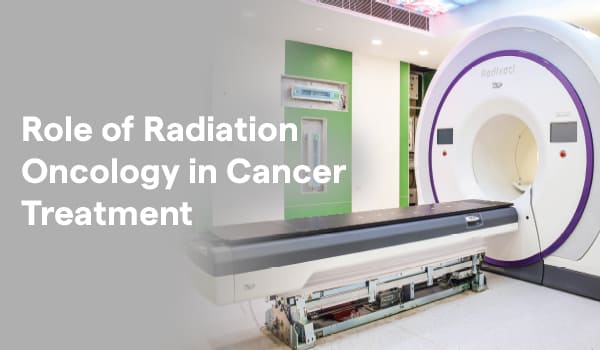
One of the most effective ways to treat cancer is radiation therapy or radiotherapy. Radiation oncology is the branch of cancer treatment that implies the use of ionizing radiation for cancer treatment. It is an important part of cancer therapy and can be applied as a single therapy or in connection with others such as surgery and chemotherapy.
Radiotherapy is a firm discipline in the field of cancer treatment that utilizes/harnesses intense beams of high-energy sources to kill the harmful, infecting cells. The entire procedure of radiotherapy is effectively regulated and targeted to kill the cancerous cells while carefully minimizing the effect of the therapy on the healthy cells. Radiation therapy could be induced both internally and externally in the human body.
The radiotherapy treatment procedures must be recommended by a radiation oncologist from the best radiation oncology hospital in Delhi, based on the condition and type of cancer the individual is suffering from. This procedure has the principal objective of producing the greatest tumor kill without causing excessive toxicity to the surrounding normal tissues. It operates by codes inside cancerous cells which cause the DNA part of the cell to break, as well as stopping cancer cells from multiplying. The radiation may be external by having a machine on the outside of the body or internal through the implantation of radioactive seeds/wires.
Radiation oncologists decide if a particular patient would benefit from the treatment of type, location, size, and stage of cancer. They offer unique treatment schedules about when, how much, and to where the radiation will be administered. Their strength is in the accuracy with which they deliver treatment to kill cancer cells, without affecting normal cells.
Radiation therapy is often given when surgery is not possible because of the location and size of the tumor, after surgical operation to eliminate residual cancerous cells, or for the palliation of painful tumors in terminal stages. Radiotherapy is perhaps the most commonly prescribed cancer treatment since more than half of cancer patients undergo radiotherapy at some point in their disease. It has cures for early-stage cancer and long-term disease control in advanced cancer with remission.
Common procedures associated with Radiation Therapy are:
1. External beam radiation: This involves highly penetrating soft x-ray beams external to the body of the tumor. It permits direct sanctions to be given with X-significant compromise to additional tissues. Such methods as 3D conformal radiotherapy, IMRT (Intensity-Modulated Radiation Therapy), and IGRT (Image Guided Radiation Therapy) enable to delivery of intensified radiation doses used in the treatment with the help of imaging control delivery.
2. Internal radiation (Brachytherapy): Radioactive substances are administered by placing isotopes directly into or just near the tumor. It applies high concentrations to localized spaces for a brief duration. In accordance with the nature of supply, the sources can be classified as temporary and enable to increase in the dose and reduce side effects.
3. Systemic radiotherapy: Such substances as iodine-131 are used, which circulate in the blood trying to identify and kill cancer cells. They are used to treat disseminated cancers such as thyroid cancer, and non-Hodgkin’s lymphomatous, metastases.
The dose fractionation schedules created are; single high dose, small multiple fractions, or continuous low dose rate. This is usually made depending on the cancer type and the patient's condition.
Automated equipment radiation techniques such as proton beam therapy, stereotactic radiosurgery, intraoperative radiotherapy, radiosensitizers, and radioprotectors have increased the effectiveness of radiation.
The computerized treatment planning system with the facility of integration of images from CT / MRI / PET scans has also led to better targeting delineation .
Radiation side effects vary with the dose, site, and other patient-related factors and may include skin reactions, nausea, fatigue and muscle, and portability. Patient-related effects seem to be temporary thus, radiation oncologists, tend to prescribe medication to balance its impact. Rare complications that can develop as a consequence of prolonged irradiation have not been reported with today’s methods.
At Sir Ganga Ram Hospital, The Department of Radiation Oncology offers advanced cancer care backed by decades of expertise and cutting-edge technology. The team of experienced radiation oncologists is dedicated to providing personalized treatment plans tailored to each patient's unique needs.
Sir Ganga Ram Hospital offers a series of advanced technology:
• TrueBeam STx Linear Accelerator: Offers versatile treatment options, including 3D conformal radiotherapy, stereotactic radiation therapy, and intensity-modulated radiation therapy (IMRT).
• Tomotherapy Radixact X9: Known for its accuracy, integrating IMRT and image-guided radiotherapy (IGRT) for personalized treatments.
• Flexitron HDR Brachytherapy Machine: Delivers radiation therapy by placing the radiation source near tumors while sparing healthy tissue.
• Somatom go. SIM CT Simulator with 4DCT: Important for planning cancer treatment. It gives radiation oncologists clear pictures of the tumor and nearby areas, helping them create personalized treatment plans. This technology also shows how the tumor moves when you breathe, making sure radiation hits the right spot while you're being treated.
It also covers cancer follow-up by performing radiological and blood tests following the treatment of the disease. One of the important elements of the treatment is patient consultation regarding the radiation, advantages, and discouragement. The research on enhancing radiation technologies and radio-biological characteristics which are carried out in this swiftly growing field for more than half of the affected people. Consequently, the specialty of radiation oncology is a valuable cancer-affected cancer management in current practice. The advancement in delivering directed forces of high-energy beams to remove or kill tumors has initiated unprecedented outcomes in cancer victims with insignificant side effects from being. It occupies an essential role at every step of illness, from cure to comfort in enhancing and prolonging life. Development does go on to enhance the use of radiation in the treatment of the disease as more becomes known. To know more, book an appointment at Sir Ganga Ram Hospital.